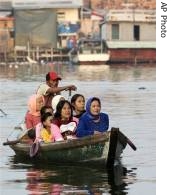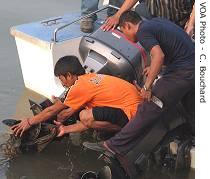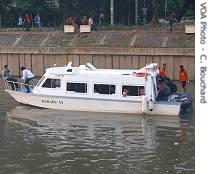2007年VOA标准英语-Jakarta Launches Alternative to Traffic Jams(在线收听)
Jakarta
21 June 2007
The Indonesian capital of Jakarta does not often draw comparisons to the romantic Italian city of Venice. But city officials would like to change that. They are testing a water taxi service, something like the one in Venice, on one of Jakarta's notoriously polluted rivers. As Chad Bouchard reports from Jakarta, the officials are hoping the taxis will someday help ease traffic in the city and encourage residents to keep the waterways clean.
On a sunny Saturday afternoon, dozens of people wait at a small metal pier on the Ciliwung River for a ride in Jakarta 's first water taxi. Many have brought their kids for a family outing.

Muslim women dressed up for Eid, ride in a water taxi towards Sunda Kelapa harbor for Eid prayers in Jakarta (file photo)
The little 25-passenger, twin-outboard boat fills up fast. With a toot of its electronic horn, it swings confidently out into the current. A few minutes later, though, the motors fall silent. The left propeller is fouled with garbage, and has stopped turning.
As the boat begins drifting toward the concrete-lined riverbank, a worker tilts the motor up and pulls old clothes, plastic bags and nameless slime from the blades.
It takes a few tries, but the motor finally catches again.
|
|
| Jakarta's first water taxi, the Kerapu VI, was once used as a ferry among islands |
This first water taxi is more for amusement than serious transportation. It operates for only a few hours on weekends, and only makes a short loop on the river. However, the city hopes to add more boats to Jakarta's 13 waterways, and create an integrated commuter network that will offer an alternative to the roads.
An estimated four million vehicles clog Jakarta's roadways, and the demand for personal vehicles is growing 11 percent each year.
Between 500,000-600,000 people bring their cars into the city from outlying areas each day, contributing to pollution and traffic congestion.
Using the city's canals to ease traffic is the brainchild of Jakarta Governor Sutioso, who hopes the waterways will become part of a mass transportation system over the next few years.
He says the waterway transport should be integrated with the city's bus routes, and connected to proposed subway and monorail lines. The new metropolitan system, he says, was designed by foreign consultants, with the idea of expanding the system to outlying areas.
Water taxis are already a common and efficient means of everyday transport in other countries. The most famous are the vaporettos of Venice.
Closer to home, in the Thai capital of Bangkok, sometimes called "the Venice of the East" municipal river taxis and ferries carry an estimated 300,000 passengers every day.
Ainsley Jolley, a researcher at the Center for economic Studies at Victoria University in Australia, says that when road congestion reaches a critical mass, as it has in Bangkok, that is when people start to demand solutions.
"Sometimes, as the chaos grows worse, the political solutions become a little bit more palatable," said Jolley. "Rising living standards create stronger pressure groups that are likely to look more kindly on policies that will work, particularly demand for mass transit."
Even if the water taxi program is implemented, there is still that problem of the garbage clogging the waterways.
Environmental activists in Jakarta estimate the city produces 8,000 tons of trash per day. Public services like garbage collection are limited, so 15 percent of that waste ends up in the canals, and there is little effort to discourage it.
 |
| A worker clears garbage from the engine |
Back aboard the boat in Jakarta, a TV cameraman named Prastiyo is checking out the water taxi on his day off. He says he doubts Jakartans will ditch their beloved cars or motorbikes anytime soon, and the trash in the water is one of the main reasons for his skepticism.
He says people will choose land transportation instead of a water taxi because there are a lot of problems, like the garbage that fouled the boat's propeller. He also says the boat is slower than a bus or a regular taxi.
Homemaker Evi Servianti is more enthusiastic about the idea. She thinks boats could provide a pleasant alternative to Jakarta's infamous traffic jams. And, like city leaders, she believes the water taxis could inspire people to take better care of the rivers and canals.
She says for the city to clean up, people will have to learn not to throw garbage around. If people who ride the canal boats become more aware of the pollution problems, she says, maybe others will be more conscientious.
As if to illustrate the challenge, a little girl on the water taxi tosses a plastic cup into the water. There is a lot of work to be done before the waterways are clean. To paraphrase the old saying, Venice was not built in a day.
